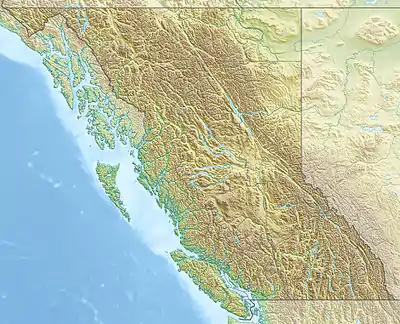Hecate Strait and Queen Charlotte Sound Glass Sponge Reefs Marine Protected Area
Hecate Strait and Queen Charlotte Sound Glass Sponge Reefs Marine Protected Area (HS/QCS MPA) is a 2,410-square-kilometre marine protected area located in Hecate Strait and Queen Charlotte Sound off the North Coast of British Columbia, Canada. The marine protected area was established in February 2017 with the goal of conserving the biological diversity, structural habitat, and ecosystem function of four glass sponge reefs. These reefs were the first discovered living specimens and are the largest glass sponge reefs in the world.[1]
| Hecate Strait and Queen Charlotte Sound Glass Sponge Reefs | |
|---|---|
 Example of a cloud sponge in Saanich Inlet | |
| Location | Hecate Strait and Queen Charlotte Sound British Columbia, Canada |
| Coordinates | 52°10′N 129°35′W |
| Area | 2,410 km2 (930 sq mi)[1] |
| Designation | Marine Protected Area |
| Designated | February 2017 (2017-02) |
| Governing body | Fisheries and Oceans Canada |
History
Prior to their discovery in 1987, glass sponge reefs were believed to have been extinct worldwide since the end of the Jurassic period.[1] The formation of glass sponge reefs requires a combination of unique geological conditions combined with the occurrence of the reef-forming species of Hexactinellid sponges.[2]
In 2018, the marine protected area was added to UNESCO's tentative list of World Heritage Sites.[3]
See also
References
- Government of Canada, Fisheries and Oceans Canada (2019-09-18). "Hecate Strait/Queen Charlotte Sound Glass Sponge Reefs Marine Protected Area (HS/QCS MPA)". www.dfo-mpo.gc.ca. Retrieved 2020-09-10.
- Centre, UNESCO World Heritage. "Hecate Strait and Queen Charlotte Sound Glass Sponge Reefs Marine Protected Area". UNESCO World Heritage Centre. Retrieved 2020-09-10.
- Centre, UNESCO World Heritage. "Hecate Strait and Queen Charlotte Sound Glass Sponge Reefs Marine Protected Area". UNESCO World Heritage Centre. Retrieved 2020-10-16.

